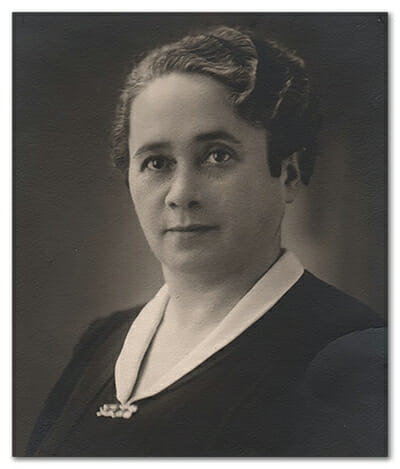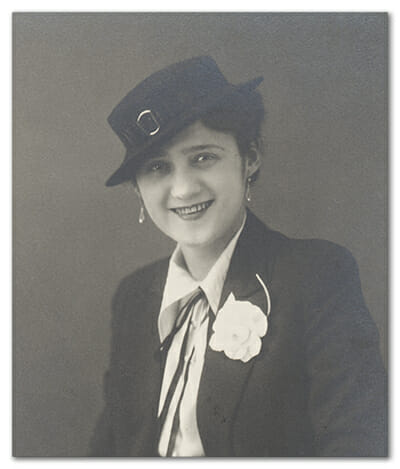Emor, Speak!
by Julia Indichova
A heartfelt thank you! to Shir Yakov Feit, the spiritual leader of the Kol Hai community for the opportunity to share this teaching.
There are a couple of reasons why this portion from the biblical cannon calls to me. Emor means “Speak!” and the question of speaking or not speaking is one I wrestle with a great deal.But the more important reason is that I grew up in Eastern Europe with lots of stories of family members whom I never got to meet. When we moved to the Hudson Valley and I started attending Shabbat services and learning Torah with Rabbi Jonathan Kligler, then learned to chant with Rabbi Yael Romer, at some point I decided to study the birth-Torah portions of the people I have come to know through my parents’ stories.

Yolan Klein Indich – My Grandmother
The chance to study the Torah portions of the lost members of my family became such a gift. It has allowed me to feel connected to them in a much more palpable way.
My brother’s birth-portion turned out to be Vayigash, which begins with Joseph re-uniting with his siblings. Emor, is both my paternal grandmother’s and her daughter’s, my aunt’s parashat. I offer this teaching to honor the memory of my grandmother Yolan Klein Indich who was 56, when she was deported, and her daughter, my aunt, Adele Indich Szigheti, who was a young, 32-year old mother when she was murdered in a massacre six months before the end of the war.

Adele Indich Szigheti – My Aunt
Emor, is in the book of Vayikra/Leviticus and one of the main themes of this portion is the requisite preparation for the role of leaders, teachers, priests of the community. The kohanim. Since all of us are called to a particular priesthood, Emor speaks to each of us.
It’s a portion saturated with sheep and goat offering and prohibitions against impurity and self- mutilations but those are not the themes I’ll be focusing on.
The line that I’m inviting us to savor is in chapter 21:6. It says that the kohanim, “shall be holy to their God, and they shall not desecrate the Name of God; For the fire offerings of Hashem, the food of their God they offer, so they must remain holy.”
How does one become holy? Why does leadership require such rigorous preparation? Rabbi Mordecai Kaplan (of blessed memory) says: “Holiness is the quality or value that things or persons have when they help others to become fully human.” It would be tough for the kohanim to lead anyone toward becoming fully human without attempting to walk that path themselves.
The leaders of the community are required to go through a demanding preparatory process—they are held to a higher moral code—for their own protection. Leadership yields a certain degree of power. And as Rabbi Kurt Vonnegut taught: “Power corrupts, We humans can get crazy drunk on power.” The kohanim must be able to resist the temptation to be corrupted from within by a sense of self-importance; resist the temptation to take in either the idolatry of their congregants or be unnerved by the kvetching and the judgments of the community members whose inflated expectations they can’t possibly meet.
As gatekeepers of integrity, special servants of Truth, the kohanim have a responsibility to act from that pristine priestly spot within the pure soul we thank God for breathing into us each day. They are expected to be blemish free before stepping into the tabernacle, the mishkan. Why?
The mishkan is meant to be the visible earthly dwelling place for the divine presence. When I think about the dialogue that is to take place in the mishkan I like to think about Martin Buber’s idea of revelation not as a dramatic, frightening, thunder and lightning event but a constant possibility of an intimate dialogue accessible to every human being. A dialogue echoing Hannah, bereft, bearing her soul in prayer, so utterly unmasked, that the priest thinks she is drunk. Or the echo of Jacob waking up from his dream, astonished, saying: “Surely, God is in this place and I did not know it.”
Stepping into the mishkan means stepping into a space of an intense encounter with the Source of Life. It’s where we might receive our next instructions, our next call to a particular priestessing and priesting that best suits our earthly mission. Stepping into the mishkan might mean an encounter with Truth we have never faced before. The flame of that meeting can consume all preconceived notions of who we are.
The seed of desire for leadership of a particular kind, the yearning to stay true to our gifts, to show up here on earth as the purest version of ourselves, is planted in all of us.
Martin Buber puts it this way: “It is the duty of every person to know and consider that they are unique in the world in their particular character and that there has never been anyone like them in the world, for if there had been someone like them, there would have been no need for them to be in the world. Every single person is a new thing in the world and is called upon to fulfill his particularity… And verily, because this is not done, is the reason why the coming of the Messiah is delayed.”
So, no pressure, but in case you’d like to know why the Messiah is delayed, you heard it here, She’s waiting until you and I show up in our full gorgeousness.
That’s also why we need well prepared, loving teachers. To help us do what Dr. Buber says is our foremost task. “To actualize our unique, unprecedented, and never recurring potentialities.” Most of us trekking through the human terrain, at one time or another, will slam the door shut, pull down the shades and endure any agony of isolation before yielding to love. We need a pair of strong parental arms that remain outstretched and open until we emerge—tearstained–from self-imposed exile. We need mothers, fathers, priestesses and priests, who will see beyond our fears the silhouette of the person we yearn to become.
“For the fire offerings of Hashem, the food of their God they offer, so they must remain holy,” is the last part of the line I’m focusing on. What is the “food offering,” that the leaders of the community must be prepared to deliver?
“Days are coming,” say the prophetic words of Amos, “days are coming, there will be a hunger in this world, but the hunger will not be for bread, and the thirst will not be for water, but to hear the word of Truth.” I imagine every generation experiences such a hunger. That time is certainly upon us now. Perhaps the training for leaders who will lead with the purest of intentions is more necessary than ever before.
It was my Grandmother, who first connected me to this Torah portion. The first leaders-priestesses, our first and most influential guides through the maze of human experiences, are our mothers. When she was a little girl, my daughter Ellena, would reach up to me when she got tired, and say, “Carry you me Mommy!” Our wisdom traditions are like the arms of the mothers who carry us when we get tired, when our priestly duties seem overwhelming. When we stand at crossroads, we can find in our Torah the invisible embrace and the sweet voice of our mothers and grandmothers shepherding the motley crew inside our hearts into safety. ““You must become the portable dwelling place for the presence of the Sacred. Let the sound of the Truth you hunger for come through you and speak! Emor, they say, Speak! “
